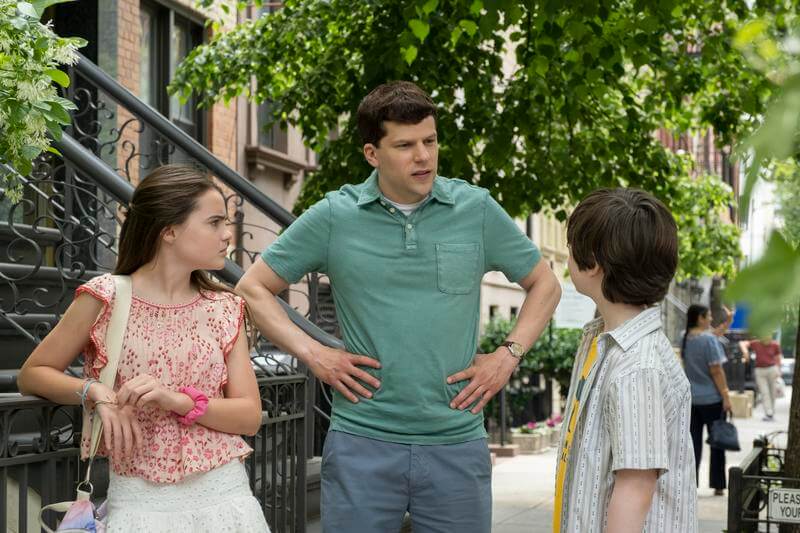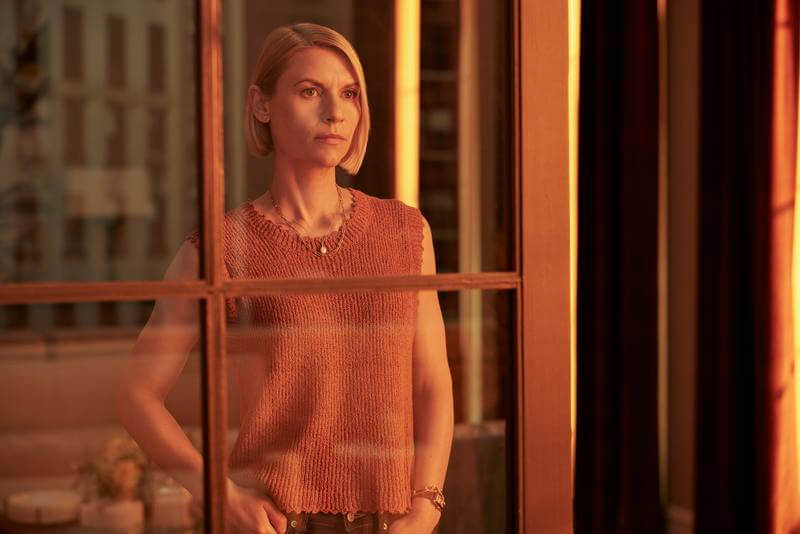Fleishman is in trouble — but in this show, so is everyone else
One cat and two human Brooklynites live vicariously through the exploits of FX’s morally bereft Upper East Side couple

Toby (Jesse Eisenberg) wrangles his kids in “Fleishman is in Trouble.” Photo by FX Studios
You won’t have to get far in “Fleishman is in Trouble,” an FX miniseries adapted from Taffy Brodesser-Akner’s novel of the same name, to understand what’s ailing the main character.
Toby Fleishman (Jesse Eisenberg), a neurotic hepatologist (liver doctor, to the uninitiated) who’s very certain that he’s a very good guy, is in trouble because he’s just divorced his workaholic talent agent wife, Rachel (Claire Danes).
He’s in trouble because while women on dating apps are practically lining up for no-strings-attached sex with this suddenly single Jewish doctor, they can’t provide the unconditional love he craves and has never found, not even within his marriage.
Most importantly, he’s in trouble because his ex-wife has dumped their two children with him on an unscheduled weekend, jetting off to a yoga retreat from which she mysteriously doesn’t return. Unfolding over the summer before the 2016 election, “Fleishman is in Trouble” follows Toby as he tries to parent his shell-shocked children and locate his wife, whose dereliction of duty makes him angrier by the day.
Rachel’s perspective, revealed midway through the series, provides a vision of the marriage that conflicts with Toby’s. From this vantage, she doesn’t seem nearly so crazy, nor her husband so saintly, as he would like to think. By the last episode, “Fleishman is in Trouble” has become something more complicated, and more worth watching, than a satire: a sneaky investigation of why women feel isolated and sidelined in a seemingly liberated era, why it remains so easy to take a husband more seriously than his wife.
While the show’s marital politics can be bleak — at one point, we floated the idea of calling our parents to confirm that marriage, as an institution, is not inherently terrible — “Fleishman” is also a spot-on satire of Toby and Rachel’s Upper East Side milieu, a world where no one has fewer than two houses and doctors are considered career failures in comparison to mortgage-crisis-inducing finance bros. Clad in luxury athleisure and armed at all times with fresh-squeezed juices, the characters in “Fleishman” are recognizable yet distant archetypes of the East Coast elite. Opening their townhouses to our judgmental gaze, the series, like Brodesser-Akner’s book, gives the hoi polloi a delicious glimpse of how the other .1% live.
Two Forward staffers and one skeptical cat sat down to watch and chat about “Fleishman is in Trouble” ahead of its Nov. 17 release. After one episode, the cat tried to eat a houseplant, by which, we believe, she meant to communicate that the ultra-wealthy should be taxed at higher rates and prevented from wearing T-shirts that say “Rosé All Day.” We thought the show took a more Whartonian stance, contrasting the professed values of New York’s elite with their much less admirable actions. We’ll never know if the cat has read “The House of Mirth.” But we’re going to take the liberty of assuming she agrees with everything we said.

‘Complicated, unlikeable middle-aged folk’
Talya Zax: Let’s take a broad view first. Do you think this is a good television show?
Irene Katz Connelly: Yes. I think the acting is stellar. As a New Yorker who doesn’t live in this rarefied Upper East Side world, I’m not ashamed to admit it satisfies a lot of voyeuristic urges. Like the Fleishmans’ apartment: there’s just room after room after room. I’ve never seen an apartment like that in real life.
Zax: There’s a fun meta text with this show where the actors are really familiar from things they played when they were younger — Claire Danes as an innocent Juliet in “Romeo and Juliet,” Jesse Eisenberg as a scheming Mark Zuckerberg in “The Social Network” — and really playing against type. It really occurred to me during the party scene where Toby and Claire meet for the first time. Watching a man approach distant, stunning Claire Danes, I was comparing it to the famous “Romeo and Juliet” scene where the lovers meet and stare at each other through a fish tank. I do think the show is playing with actors we know and love playing complicated, usually unlikeable middle-aged folk in this show.
‘Is that formula?’
Zax: I’m interested in structure, and where the show departs from the book. Without too many spoilers, the book is pretty effective: You spend 200 pages thinking it’s about Toby, and then a pivot comes and you realize it’s actually been about Rachel the whole time. Because there are so many flashbacks in the book, Rachel is threaded through it from the start. But for the first few episodes of the show, you almost never see Rachel on screen. It really feels like it’s Toby’s show.
Katz Connelly: I felt that it was transparent from the outset that Toby is not a great person.
Zax: Yeah, it starts with him objectifying women in bed.
Katz Connelly: Objectifying women, doing the bare minimum as a father and complaining about it, letting other characters tell him how amazing he is for grocery shopping. Even if I hadn’t read the book, I would have had this feeling that either the show was completely outdated, or a big twist was coming. One moment that really struck me is a flashback from Toby’s perspective, in which he gets home and finds that Rachel has gone back to work and left their infant daughter to drink formula with the nanny. And he’s aghast, like, “Is that formula?” You immediately know that we have to get another side, because we’re not sitting around in 2022 being told that mothers who formula-feed are bad mothers.
Zax: This is why Jesse Eisenberg, despite not looking middle-aged at all, is a really good fit for this role. He is so good at weaponizing his inoffensiveness. Just by virtue of not being a pompous ass, he’s the most likable guy there. With his demeanor, with his general bearing, he’s really good at making you think he’s a good husband, a good father, a normal dude who wants to save lives, and that his wife’s crazy.
But then little things creep in, like the formula. I was really struck by his comments after Rachel goes to a support group. In his recollection, he says something like, “I’m glad it worked.” Dude! You’re a doctor — you of all people should know that your wife isn’t going to be “fixed” by one support group. Also, sorry for getting graphic on the Forward readership, but Toby is always talking about getting to “put his penis in” various women.
Katz Connelly: So vile. It’s the worst visualization.
Zax: It could not sound more clinical and more devoid of interest in the receptacle. That’s what it sounds like, right? The woman is the receptacle.
Katz Connelly: Part of the reason that comment sounds seedy is that sex has never seemed worse or less appealing than it does in this show. There are these trippy visual effects where Toby and his various partners spin around as one replaces another. You have this feeling that he’s not so much a grown-up as a child viewing a banquet of porn and not quite knowing how to behave.
Zax: It reminded me of the kind of movie scene in which someone takes psychedelics and for a moment, everything seems really cool and great. But then the trip turns horrible, the party becomes really loud, and everyone looks grotesque. The women’s reactions to Toby are also incredibly exaggerated and performative. But he believes them to be real. He never questions whether these women actually find him to be extraordinary as a lover, and that’s sort of a distillation of his character.

‘There has to be more to being a woman than competing’
Katz Connelly: I’m interested in where the show satirizes women, specifically the women of Toby and Rachel’s very affluent sphere, and where it tries to understand them. What are your thoughts?
Zax: I can’t get past the cliches of a woman who is obsessed with the trappings of money and prestige because she feels like an outsider and has had a sexually traumatic experience. (While Rachel is giving birth to her first child, a doctor examines her and breaks her water without her consent, setting off a period of extreme postpartum depression.) It’s not that that’s not a real story. But being a woman has to be more than competing and being traumatized. There just has to be more.
Katz Connelly: I have to say, Rachel’s childbirth hit me hard, in the book and also in the show. Insofar as there’s something really new in “Fleishman,” I think it’s labeling Rachel’s experience clearly as sexual assault. I cried during that.
Zax: I felt like my body was going to fall apart during that scene. But I still feel like there have to be stories of women’s trauma that don’t end up with them becoming fragile ice princesses who eventually collapse.
Katz Connelly: What you’re saying is making me think about Parul Seghal’s essay about trauma plots. She argues that many contemporary books rely too much on a moment of trauma in a character’s past to explain all their motivations and decisions, and that this makes for very overdetermined stories. Something like that is definitely going on in “Fleishman,” because all of the big reveals about Rachel are just learning new information about her past that, in the show’s universe, explain all her behavior and make it inevitable that she ended up the way she has.
Zax: It does feel very pre-ordained to say that a woman with this set of experiences must end up this way. Maybe because of this, Rachel doesn’t seem like she has a consistent character. The young Rachel who meets Toby at the party and exists until she finds out she’s pregnant has very little relationship to the Rachel that follows. Claire Danes has worked really hard to plant the seeds of that later character in the younger one. But ultimately, Rachel does feel like a vessel for the experiences she has. She lacks the complicating influence of a human soul, which filters experience and causes people to turn out in so many different ways.
Katz Connelly: She’s also a vessel for generalized female anxiety about motherhood and having a career. What bugged me the most in “Fleishman” is the way it relies on the fact of Rachel working to create tension, even in the episodes when it embraces her perspective. Many of the textbook working-mom moments — Rachel coming home late, or taking calls while her kids play — felt familiar from my own childhood. Not as disasters, but as benign elements of family life. To see the show treating them as evidence, at least from Toby’s perspective, that this family is in crisis felt really outdated.
Zax: Another big part of the show is that it’s set during the 2016 election. Lots of characters are talking about how unlikeable Hillary is, even as she’s clearly a foil for Rachel as a successful woman. One thing I’m questioning is how much the series wants to entertain us with how horrible these people are, and how much it wants us to empathize with them.
Katz Connelly: The women who surround Rachel remain the objects of satire all the way through. There’s nothing redeeming about them. They don’t work; they only talk about getting their kids into good schools; there’s a recurring gag in which they wear tacky exercise T-shirts that say “Rosé All Day” or “Boss bitch.” Rachel is essentially trying to become them, and the only thing that differentiates her is that she started as an outsider and worked her way into all this privilege. But by the end of the show, we’re supposed to relate to Rachel, and to excuse her desire for wealth and prestige because of her traumatic backstory. If Rachel is complicated and human, those other women should be, too.
Zax: I’d like to point out one redeeming moment, which is that one of the other moms does a Groucho Marx voice whenever she has anything even remotely uncomfortable to communicate. It’s so believable that this woman is so conflict-averse, so committed to making things nice for people, that the only way she can approach difficult topics is to speak out of the side of her mouth and pretend she’s from the 1940s.
‘We’re so used to seeing those Jewish parents on TV’
Zax: Why did we both start laughing when Toby’s Jewish parents showed up?
Katz Connelly: I don’t know whether the parents are so relatable because we’ve met Jewish parents like that or because we’re so used to seeing those Jewish parents on TV: the dad with curly hair and a beaky nose, the frumpy middle-class house …
Zax: The mom with no boundaries. Part of me feels like there’s one set of Jewish parents that gets passed around from one TV show to another. It’s funny, but in some ways it’s annoying that it’s the same template all the time.
Katz Connelly: And Toby has some interesting stuff going on where he’s repulsed by the way his mother and sister look, which is to say brunette and a little zaftig, and so to escape that he must marry tall, equine, blonde Rachel.
Zax: If you are looking for commentary on the internalized hatred of Jewish women, Toby Fleishman is it. It should be said that the first time he sleeps with Rachel, there’s a very prominently placed copy of “Portnoy’s Complaint” by the bed.
Katz Connelly: I wonder if non-Jewish audiences will be attuned to this subtext. I’m sure there’s a wide swath of people who would just accept it as natural that Toby’s not attracted to this kind of woman.
Zax: I will never forget, when I read “All of a Kind Family” as a child, the book says that all the other immigrant Jewish women on the Lower East Side looked like mattresses with belts around them. But the narrator’s mother is beautiful and slender. It’s not that the actors in “Fleishman” look like that, but the show does not depict “traditional” Jewish womanhood as attractive. It buys into Toby’s view of it.

‘The ways that money can form or deform’
Zax: I want to throw out one more thing, which is that “Fleishman” reminded me a lot of Edith Wharton. I wonder if this is a contemporary Jewish spin on the clash between old and new money, and the ways that money can form or deform a character.
Katz Connelly: If there’s a distinction being made here, it’s between the upper class who are very comfortable with their status and unquestioning of their power, and people like Toby, who think of themselves as middle class even though they are part of this elite realm as well. I think Toby’s insistence that his children live out his values of restraint and frugality at every turn, even when it’s torture for them to do so, is less a manifestation of strong ethics than a manifestation of discomfort at actually being quite like the people he despises.
Zax: A great example of this is the cellphone subplot. Toby insists that his daughter, Hannah, can’t have one until she turns 12, even though she’s suffering social torment and all the other moms are like, “You need to get this girl a phone.” But he ultimately gives in as a way to make her feel better about a mistake he’s made. Toby thinks he’s trying to protect his daughter’s little brain as it develops and prevent her from being corrupted by her class. But then we see how Toby uses his own phone, which is mostly to look at soft-core porn women are sending to him. He has no control, and it leads to a lot of really bad situations for his children.
There’s a hypocrisy in not trusting Hannah to have a phone but engaging in all this degrading and depersonalized behavior with his own phone. It’s like, what are your actual values? And are you living them out, or just thinking about them?
A message from our Publisher & CEO Rachel Fishman Feddersen

I hope you appreciated this article. Before you go, I’d like to ask you to please support the Forward’s award-winning, nonprofit journalism so that we can be prepared for whatever news 2025 brings.
At a time when other newsrooms are closing or cutting back, the Forward has removed its paywall and invested additional resources to report on the ground from Israel and around the U.S. on the impact of the war, rising antisemitism and polarized discourse.
Readers like you make it all possible. Support our work by becoming a Forward Member and connect with our journalism and your community.
— Rachel Fishman Feddersen, Publisher and CEO































